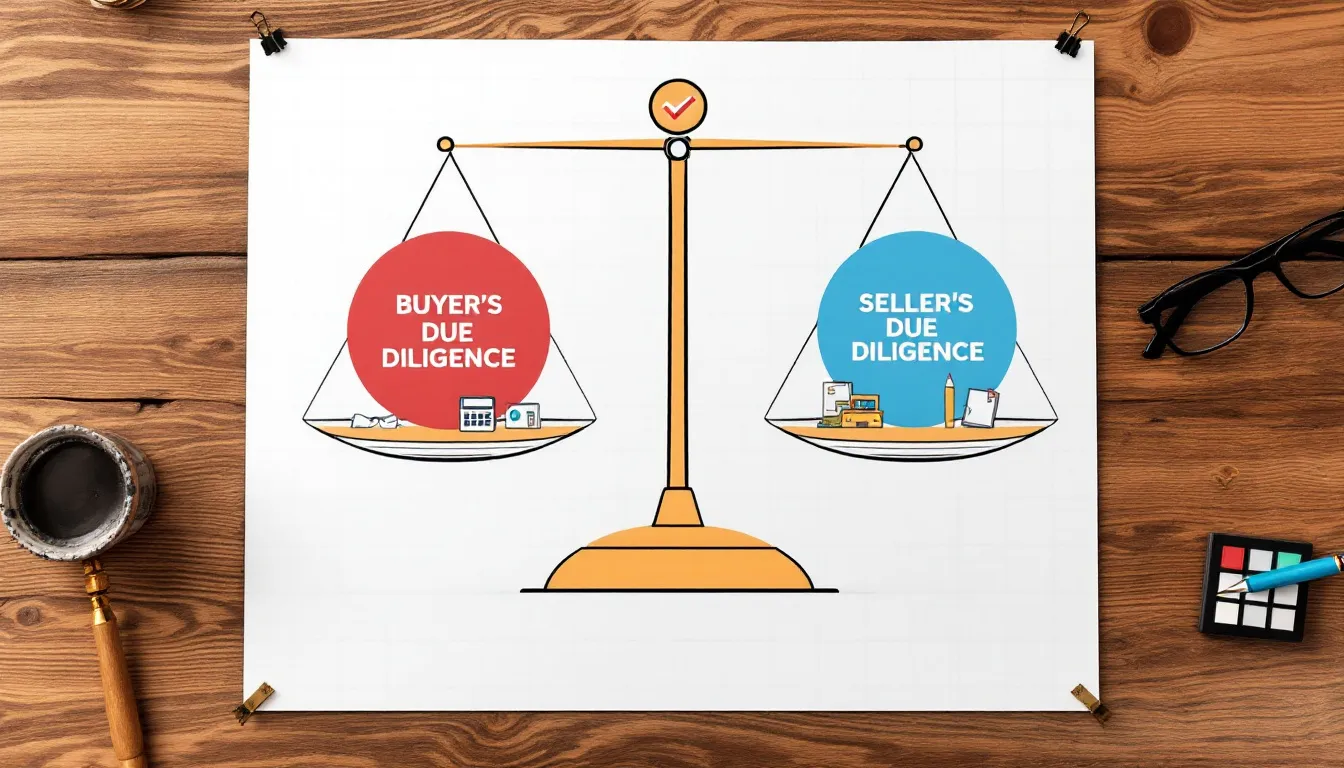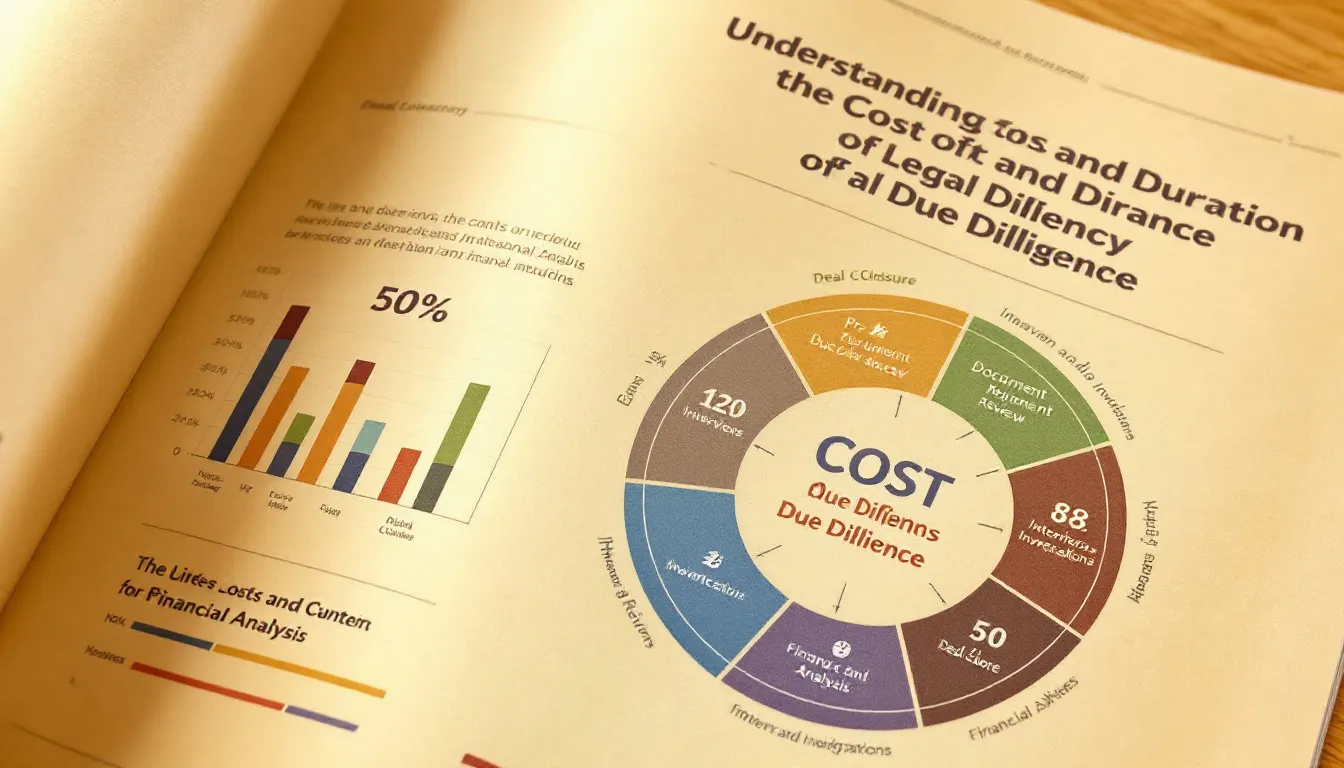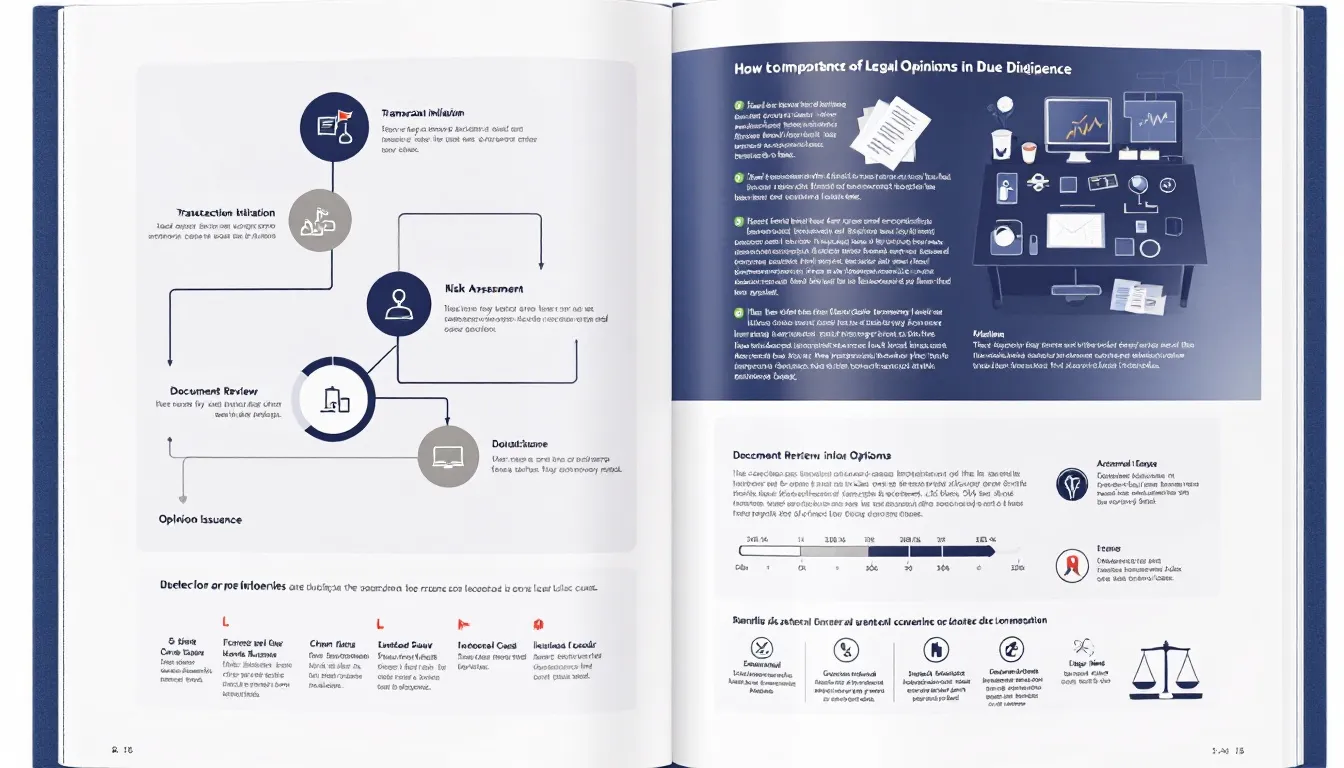Malcolm ZoppiFri Feb 14 2025
What Is Legal Due Diligence and How To Master It
Legal due diligence is a crucial process in business transactions, especially mergers and acquisitions. It involves a thorough review of the target company’s legal documents, contracts, and other critical information. The goal is to identify any potential legal risks, liabilities, and opportunities to ensure informed decision-making and protect the interests of the parties involved. In […]
Legal due diligence is a crucial process in business transactions, especially mergers and acquisitions. It involves a thorough review of the target company’s legal documents, contracts, and other critical information. The goal is to identify any potential legal risks, liabilities, and opportunities to ensure informed decision-making and protect the interests of the parties involved. In this article, we’ll explore what is legal due diligence, the key components of legal due diligence, its benefits, and the steps involved in conducting it effectively.
Key Takeaways
Legal due diligence is essential in M&A transactions, serving to identify potential liabilities and opportunities, thereby protecting buyers’ interests and ensuring informed decisions.
The process involves several key components, including corporate document review, contract analysis, litigation reviews, and intellectual property assessments, each critical for addressing risks and compliance.
Effective legal due diligence offers substantial ROI by mitigating risks and helping buyers negotiate better terms, while also preparing sellers to present their company favourably.
Understanding Legal Due Diligence
The diligence process is a fundamental aspect of any significant business transaction, particularly in mergers and acquisitions (M&A). Legal due diligence involves collecting and assessing legal documents, contracts, and information to thoroughly evaluate the target company’s legal aspects, such as corporate compliance, litigation disputes, and intellectual property ownership. The primary purpose of legal due diligence is to audit and review the target company to assess potential liabilities and risks, ensuring that buyers are fully informed about what they are acquiring.
In the world of business acquisitions, the ancient principle of “Buyer Beware” (Caveat Emptor) remains relevant. It is the buyer’s responsibility to familiarise themselves with the target business, making legal due diligence an indispensable part of the acquisition process. However, the benefits extend beyond merely identifying risks. Legal due diligence can also reveal opportunities for value enhancement by providing a detailed understanding of the target company’s legal framework and operations.
Conducting legal due diligence enables buyers to proceed with a purchase with confidence. A deeper exploration of the components and processes involved in legal due diligence will provide a clearer understanding of mastering this critical aspect of M&A.
Key Components of Legal Due Diligence
Legal due diligence encompasses various elements that collectively provide a comprehensive view of the target company’s legal standing. From corporate document review to contract analysis, litigation reviews, intellectual property ownership, and uncovering hidden issues, each component plays a vital role in identifying potential liabilities and ensuring regulatory compliance. A legal due diligence checklist can help streamline this process.
Let’s explore these components in detail to understand their significance and how they contribute to a thorough due diligence process.
Corporate Document Review
Reviewing corporate governance documents meticulously is a key part of the legal due diligence process. This step confirms the proper structure and function of the target company, ensuring compliance with relevant regulations like the UK Companies Act 2006. Examining documents such as articles of incorporation, the shareholders’ agreement, and minutes of board meetings allows legal professionals to verify the company’s adherence to its legal framework and established protocols.
Moreover, corporate document review helps identify any discrepancies or issues that might impact the transaction. For instance, understanding control provisions and shareholder agreements can reveal potential obstacles or conditions that must be addressed to facilitate a smooth acquisition.
This comprehensive document review is not only about confirming compliance but also about ensuring that the target entity is legally sound and well-governed.
Contract Analysis
Analysing contracts is another critical component of legal due diligence. This involves a thorough review of various types of agreements, including commercial contracts, customer and supply contracts, and employee agreements. Scrutinising these documents helps lawyers identify clauses or conditions that might affect the transaction, such as change of control provisions, that could jeopardise the value of the business.
Understanding the obligations and risks associated with these contracts is crucial for both buyers and sellers. For buyers, it provides insight into the target company’s operational commitments and potential liabilities.
For sellers, it helps in presenting a clear and accurate picture of the company’s contractual landscape, thereby facilitating a smoother negotiation process. This meticulous contract analysis is essential for ensuring that all parties are fully aware of their rights and responsibilities under existing agreements. Further, if the seller can show that they have disclosed a specific issue with the target, they typically cannot be held liable for that issue.
Litigation and Dispute Review
Investigating ongoing or past litigation is a vital step in the legal due diligence process. This review uncovers potential legal risks and liabilities that could affect the transaction. By examining court records, legal filings, and dispute histories, legal professionals can identify any legal challenges the target company has faced or is currently facing during the diligence investigation.
Understanding the nature and status of these disputes helps mitigate potential liabilities. For instance, unresolved litigation or regulatory investigations could pose significant risks to the transaction’s success.
Addressing these issues proactively allows buyers to make informed decisions and negotiate terms that protect their interests. This litigation and dispute review ensures that all potential legal pitfalls are identified and managed effectively.
Intellectual property ownership
Intellectual property (IP) is often a valuable asset in business transactions, making its ownership and management a critical component of legal due diligence. Verifying who owns the IP, whether trademarks are registered, and if the target company is party to any expensive or potentially problematic licensing agreements are key considerations.
Furthermore, it’s essential to assess whether any critical IP is licensed from a third party who may not renew the agreement. This aspect of due diligence helps identify any risks associated with IP ownership and ensures that the buyer is fully aware of the value and limitations of the target company’s intellectual assets. Managing IP due diligence properly prevents future disputes and safeguards the transaction’s success.
Beware: Hidden issues
In the competitive world of business, hidden issues can pose significant risks to the success of a transaction. Legal due diligence is critical in identifying these potential risks, such as whether major customers are other group companies and if they will continue doing business post-acquisition.
Other hidden issues could include sellers starting a competing business, major suppliers ending their contracts, or key employees serving notice to leave the company. Early identification of these issues in the due diligence process allows buyers to address them proactively and negotiate terms that protect their interests.
This thorough examination helps ensure that there are no unpleasant surprises after the deal is completed.
Conducting Legal Due Diligence
Conducting legal due diligence involves several critical steps, from gathering information to reviewing documents and reporting findings. Defining the due diligence task clarifies client needs and establishes focus. A diligence checklist legal can help streamline this process.
The process typically begins after parties have agreed to a deal in principle (usually by signing heads of terms) and involves requesting key documentation, reviewing evidence, and producing a findings report. Working with an expert team during this process is essential for efficiency and thoroughness.
Gathering Information
The gathering of information is a foundational step in the due diligence process. Typically, the buyer initiates this process by issuing a due diligence questionnaire to the seller, outlining the documents and information needed for evaluation. This questionnaire often includes corporate governance documents, contracts, and other key information essential for informed decision-making.
Effective preparation is absolutely essential. Sellers should begin organising necessary documents ahead of time and involve legal and financial experts to prevent rushed evaluations and ensure accuracy.
A due diligence checklist keeps the diligence team organised and focused on finding relevant information for deal negotiations. This systematic approach ensures thorough scrutiny of all aspects of the target company’s operations.
Reviewing Documents
The document review process in legal due diligence involves a methodical examination of both corporate and legal documents related to the target company. A systematic evaluation of these documents is essential to identify discrepancies, compliance issues, and risks that could affect the transaction. Legal experts contribute their expertise in interpreting complex legal documents and understanding regulatory requirements, ensuring that all material information is disclosed and assessed.
Legal advisers play a critical role in this process, providing insights that protect the interests of their clients and help identify potential liabilities. Thorough document review ensures smooth transaction proceedings and awareness of any potential legal challenges, supported by a dedicated legal team.
Reporting Findings
The final step in the legal due diligence process is reporting findings. The diligence report serves as a comprehensive summary of key findings and recommendations, outlining any potential risks and liabilities identified during the review. Some buyers may choose a red-flag report, which focuses on key issues identified, enabling quick informed decisions.
This report is essential for guiding negotiations and ensuring that all parties are aware of the legal landscape. Clear communication of findings and their consequences in the diligence report helps buyers and sellers navigate transaction complexities and make informed, strategic decisions.
Legal Due Diligence for Buyers vs. Sellers

The legal due diligence process varies significantly for buyers and sellers, each with distinct goals and approaches. For buyers, the primary focus is on assessing the value and risks associated with the target company. This involves identifying potential liabilities, understanding the legal framework, and determining a fair purchase price. Legal due diligence enables buyers to make informed decisions, prepare strong M&A contracts, and avoid potential legal issues.
On the other hand, sellers aim to present the company favourably to secure the best deal. This involves collating information, addressing issues proactively, and ensuring compliance with data regulations.
Understanding the different perspectives of both the buyer and sellers highlights the comprehensive nature of the due diligence process and its role in facilitating successful transactions.
Buy-Side Due Diligence
For buyers, legal due diligence involves uncovering potential liabilities and negotiating the best terms for the M&A agreement. Buyers may hire external legal teams to ensure that all legal aspects of the target company’s business are thoroughly examined. Detailed scrutiny helps buyers understand the target company’s operations, legal risks, and regulatory compliance.
Acquiring a legal opinion often aids in negotiation strategies by identifying strengths and weaknesses in the deal. This comprehensive approach ensures buyers are fully informed, enabling strategic decisions that protect their investment and facilitate a successful transaction.
Sell-Side Due Diligence
For sellers, the goal of sell-side due diligence is to prepare for a smooth and timely sale while addressing any issues that may affect the company’s value. A well-prepared seller can significantly enhance the value of their company by collating information and addressing issues proactively before due diligence begins. This preparation includes gathering relevant information, providing a report detailing their due diligence review results, and ensuring compliance with non-disclosure agreements.
Sellers must comply with relevant data regulations during due diligence to ensure all shared information is lawful. By preparing thoroughly, sellers can present their company in the best light, facilitating a smoother transaction and securing a favourable deal.
Cost and Duration of Legal Due Diligence

The cost and duration of legal due diligence can vary depending on several factors, including the size and nature of the target entity. In the UK, legal due diligence generally takes 1 to 3 months and, at Zoppi & Co, can cost anywhere between £1,000 + VAT up to £30,000 + VAT. Learn more about the legal costs here.
Both buyers and sellers typically bear their own due diligence costs, which can be substantial but are generally considered a worthwhile investment to prevent costly legal issues later.
Though not cheap, legal due diligence is often more affordable than discovering legal issues after closing the deal. Both parties incur costs associated with due diligence investigations, emphasising the importance of thorough and efficient processes to protect their interests.
Due diligence ROI
The return on investment (ROI) of conducting thorough legal due diligence can be substantial. Some law firms, such as Zoppi & Co, actively help buyers negotiate a reduction in the purchase price following the discovery of legal issues with the target business, making due diligence pay for itself. Identifying potential liabilities and providing actionable solutions through legal due diligence helps buyers make informed decisions and protect their investments.
This risk-based approach ensures that buyers are aware of any legal challenges and can address them proactively. Investing in thorough due diligence helps buyers avoid costly surprises and ensures the long-term success of their acquisition.
Importance of Legal Opinions

In M&A transactions, obtaining a legal opinion is crucial. It helps to identify hidden risks and supports informed decision-making. Legal teams provide expert opinions that support acquisition decisions during the due diligence process.
Obtaining legal opinions, identifying hidden risks, and using expert insights together contribute to a sound decision-making framework in M&A transactions. This ensures that all parties are fully aware of the potential challenges and can navigate the complexities of the transaction with confidence.
Summary
Legal due diligence is an essential component of successful business transactions, particularly in M&A deals. By thoroughly evaluating the target company’s legal aspects, including corporate documents, contracts, litigation, intellectual property, and potential hidden issues, buyers and sellers can make informed decisions and mitigate risks. The due diligence process, although time-consuming and costly, offers significant returns on investment by protecting parties from potential legal pitfalls and enhancing the overall value of the transaction.
In conclusion, mastering legal due diligence requires a systematic and comprehensive approach. By understanding the key components, the roles of buyers and sellers, and the importance of legal opinions, you can navigate the complexities of M&A transactions with confidence and ensure a successful outcome. Thorough due diligence and expert guidance are the keys to securing a favourable deal.
Frequently Asked Questions
What is the primary purpose of legal due diligence in M&A transactions?
The primary purpose of legal due diligence in M&A transactions is to audit and review the target company, allowing buyers to assess potential liabilities and risks effectively. This process ensures that buyers are fully informed about the nature of their acquisition.
Why is corporate document review important in legal due diligence?
Corporate document review is essential in legal due diligence as it verifies the target company’s structure and compliance with regulations, while also uncovering any discrepancies that could affect the transaction. This process ultimately safeguards the interests of the parties involved.
How do legal opinions support decision-making in M&A transactions?
Legal opinions are essential in M&A transactions as they reveal hidden risks and offer expert insights, thereby guiding informed decision-making and ensuring all parties recognise potential challenges.
What are the typical costs and duration of legal due diligence?
Legal due diligence in the UK generally takes 1 to 3 months and, at Zoppi & Co, can cost anywhere between £1,000 + VAT up to £30,000 + VAT. Learn more about the legal costs here.